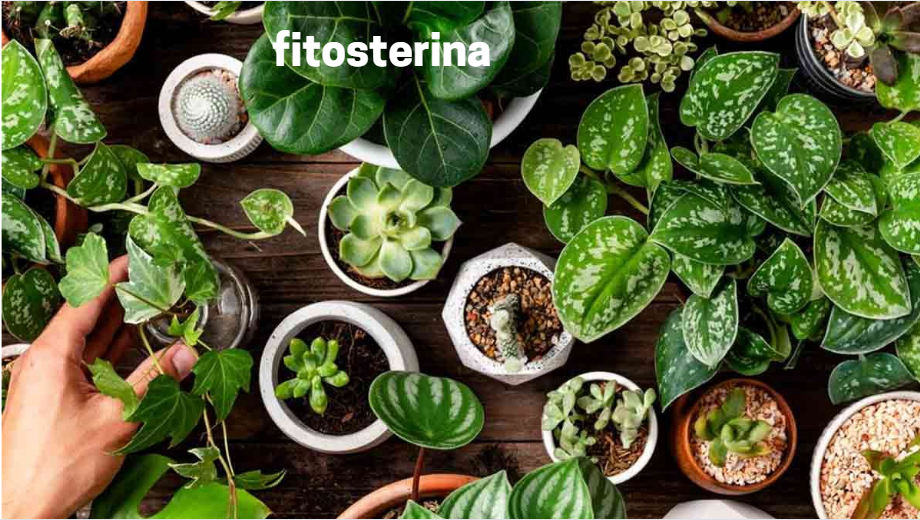Fitosterina: A Comprehensive Guide to Plant Sterols
Fitosterina, also known as plant sterols, is a fascinating molecule found in a variety of plants. Over the past few decades, scientific interest in fitosterina has surged due to its potential health benefits, especially in relation to heart health.
This article aims to provide an in-depth exploration of fitosterina, including its sources, benefits, mechanisms of action, and applications. We will also delve into unique insights and analyses that go beyond existing information to help you understand the significance of this molecule.
Contents
- 1 What is Fitosterina?
- 2 Sources of Fitosterina
- 3 Health Benefits of Fitosterina
- 4 Mechanisms of Action
- 5 Applications of Fitosterina
- 6 Unique Insights and Analyses
- 7 Frequently Asked Questions (FAQs)
- 7.1 1. What is fitosterina?
- 7.2 2. How does fitosterina lower cholesterol?
- 7.3 3. Which foods are high in fitosterina?
- 7.4 4. Are there any side effects of fitosterina?
- 7.5 5. Can fitosterina help with weight loss?
- 7.6 6. Is fitosterina suitable for vegetarians and vegans?
- 7.7 7. Can fitosterina interact with medications?
- 7.8 8. How much fitosterina should I consume daily?
- 7.9 9. Is fitosterina beneficial for children?
- 7.10 10. Can fitosterina improve skin health?
- 8 Conclusion
What is Fitosterina?
Fitosterina, or plant sterols, are a group of naturally occurring compounds found in plant cell membranes. They are structurally similar to cholesterol, which is found in animal cells.
The primary types of fitosterina include beta-sitosterol, campesterol, and stigmasterol. These compounds are known for their ability to lower cholesterol levels in humans, making them a popular ingredient in functional foods and dietary supplements.
Sources of Fitosterina
Fitosterina is present in various plant-based foods. Some of the richest sources include:
- Vegetable Oils: Oils such as corn oil, soybean oil, and canola oil are high in fitosterina.
- Nuts and Seeds: Almonds, walnuts, sunflower seeds, and sesame seeds are excellent sources.
- Legumes: Beans, lentils, and peas contain significant amounts of fitosterina.
- Whole Grains: Foods like wheat germ, bran, and whole wheat bread are good sources.
- Fruits and Vegetables: Certain fruits and vegetables, including avocados, carrots, and broccoli, contain fitosterina in smaller amounts.
Health Benefits of Fitosterina
1. Cholesterol Reduction
The most well-known benefit of fitosterina is its ability to lower LDL (low-density lipoprotein) cholesterol levels. Fitosterina competes with cholesterol for absorption in the intestines, reducing the amount of cholesterol that enters the bloodstream. Studies have shown that consuming 2 grams of fitosterina per day can lower LDL cholesterol by approximately 10%.
2. Cardiovascular Health
By lowering cholesterol levels, fitosterina helps reduce the risk of cardiovascular diseases such as heart attacks and strokes. Lower LDL cholesterol levels are associated with a decreased risk of plaque buildup in the arteries, improving overall heart health.
3. Anti-Inflammatory Properties
Fitosterina has been found to possess anti-inflammatory properties, which can help in managing chronic inflammatory conditions. Inflammation plays a key role in many diseases, including arthritis and metabolic syndrome. By reducing inflammation, fitosterina may help alleviate symptoms and improve quality of life.
4. Antioxidant Effects
Plant sterols exhibit antioxidant properties, helping to neutralize free radicals in the body. Free radicals can cause oxidative stress, leading to cell damage and contributing to the development of chronic diseases such as cancer and heart disease. The antioxidant effects of fitosterina may help protect cells and reduce the risk of these conditions.
5. Immune System Support
Fitosterina may also support the immune system by modulating immune responses. Some studies suggest that plant sterols can enhance the activity of certain immune cells, potentially improving the body’s ability to fight infections and diseases.
Mechanisms of Action
The health benefits of fitosterina are primarily attributed to its structural similarity to cholesterol. This similarity allows fitosterina to interfere with the absorption of cholesterol in the intestines. Here’s how it works:
- Competition for Absorption: Fitosterina and cholesterol compete for the same transport mechanisms in the intestinal wall. Since fitosterina is absorbed preferentially, less cholesterol is absorbed, and more is excreted from the body.
- Inhibition of Cholesterol Esterification: Fitosterina inhibits the esterification of cholesterol, a process necessary for cholesterol absorption. This further reduces the amount of cholesterol that enters the bloodstream.
- Increased Cholesterol Excretion: By reducing cholesterol absorption, fitosterina increases the excretion of cholesterol through the feces.
Applications of Fitosterina
1. Functional Foods
Many food products are now fortified with fitosterina to help consumers manage their cholesterol levels. Common examples include margarines, spreads, yogurts, and orange juice. These products are marketed as heart-healthy options due to their cholesterol-lowering benefits.
2. Dietary Supplements
Fitosterina is also available in the form of dietary supplements. These supplements provide a concentrated dose of plant sterols, making it easier for individuals to achieve the recommended daily intake. Supplements are particularly beneficial for people who do not consume enough plant-based foods in their diet.
3. Cosmetic Products
Due to its anti-inflammatory and antioxidant properties, fitosterina is used in various cosmetic and skincare products. It is believed to help improve skin health, reduce inflammation, and protect against environmental damage.
4. Pharmaceuticals
Research is ongoing to explore the potential pharmaceutical applications of fitosterina. Its ability to modulate immune responses and reduce inflammation makes it a promising candidate for the development of new medications for autoimmune diseases and inflammatory conditions.
Unique Insights and Analyses
While the benefits of fitosterina are well-documented, there are several areas where more research is needed. Here are some unique insights and analyses that go beyond existing information:
1. Synergistic Effects with Other Nutrients
There is growing interest in understanding how fitosterina interacts with other nutrients in the diet. For example, some studies suggest that the combination of fitosterina with omega-3 fatty acids may have synergistic effects on heart health. Exploring these interactions could lead to the development of more effective dietary strategies for managing cholesterol levels.
2. Personalized Nutrition
The effectiveness of fitosterina may vary depending on individual genetic factors. Personalized nutrition approaches that consider genetic variations could help optimize the benefits of fitosterina for different individuals. This field of research, known as nutrigenomics, has the potential to revolutionize dietary recommendations and improve health outcomes.
3. Long-Term Safety and Efficacy
While fitosterina is generally considered safe, long-term studies are needed to fully understand its safety and efficacy. Investigating the long-term effects of high-dose fitosterina supplementation and its impact on overall health is crucial for developing comprehensive dietary guidelines.
4. Potential in Preventive Medicine
Fitosterina’s ability to modulate immune responses and reduce inflammation suggests potential applications in preventive medicine. Further research could explore how fitosterina can be used to prevent or manage chronic diseases beyond cardiovascular conditions, such as autoimmune disorders and certain cancers.
Frequently Asked Questions (FAQs)
1. What is fitosterina?
Fitosterina, also known as plant sterols, are naturally occurring compounds found in plant cell membranes. They are structurally similar to cholesterol and are known for their ability to lower LDL cholesterol levels in humans.
2. How does fitosterina lower cholesterol?
Fitosterina competes with cholesterol for absorption in the intestines, reducing the amount of cholesterol that enters the bloodstream. This results in lower LDL cholesterol levels.
3. Which foods are high in fitosterina?
Foods high in fitosterina include vegetable oils (corn oil, soybean oil), nuts and seeds (almonds, sunflower seeds), legumes (beans, lentils), whole grains (wheat germ, bran), and certain fruits and vegetables (avocados, carrots).
4. Are there any side effects of fitosterina?
Fitosterina is generally considered safe when consumed in recommended amounts. However, excessive intake may cause gastrointestinal issues such as diarrhea and bloating in some individuals.
5. Can fitosterina help with weight loss?
While fitosterina is primarily known for its cholesterol-lowering effects, some studies suggest that it may also help with weight management by reducing fat absorption. However, more research is needed in this area.
6. Is fitosterina suitable for vegetarians and vegans?
Yes, fitosterina is derived from plant sources and is suitable for vegetarians and vegans.
7. Can fitosterina interact with medications?
Fitosterina may interact with certain medications, such as cholesterol-lowering drugs (statins). It is advisable to consult a healthcare professional before starting fitosterina supplements if you are taking any medications.
8. How much fitosterina should I consume daily?
The recommended daily intake of fitosterina is around 2 grams per day to achieve significant cholesterol-lowering effects. This amount can be obtained through a combination of fortified foods and dietary supplements.
9. Is fitosterina beneficial for children?
Fitosterina can be beneficial for children with high cholesterol levels, but it is essential to consult a pediatrician before introducing fitosterina supplements into a child’s diet.
10. Can fitosterina improve skin health?
Fitosterina’s anti-inflammatory and antioxidant properties make it a valuable ingredient in cosmetic products. It may help improve skin health by reducing inflammation and protecting against environmental damage.
Conclusion
Fitosterina, or plant sterols, is a powerful molecule with numerous health benefits, particularly in lowering cholesterol levels and promoting cardiovascular health. As research continues to uncover the potential of fitosterina, its applications in functional foods, dietary supplements, cosmetics, and pharmaceuticals are expanding. By incorporating fitosterina-rich foods into your diet, you can take a proactive step towards improving your overall health and well-being.
Understanding the unique properties of fitosterina and its mechanisms of action allows us to appreciate its role in preventive medicine and personalized nutrition. With ongoing research and innovation, fitosterina holds promise as a key player in the future of health and wellness.

